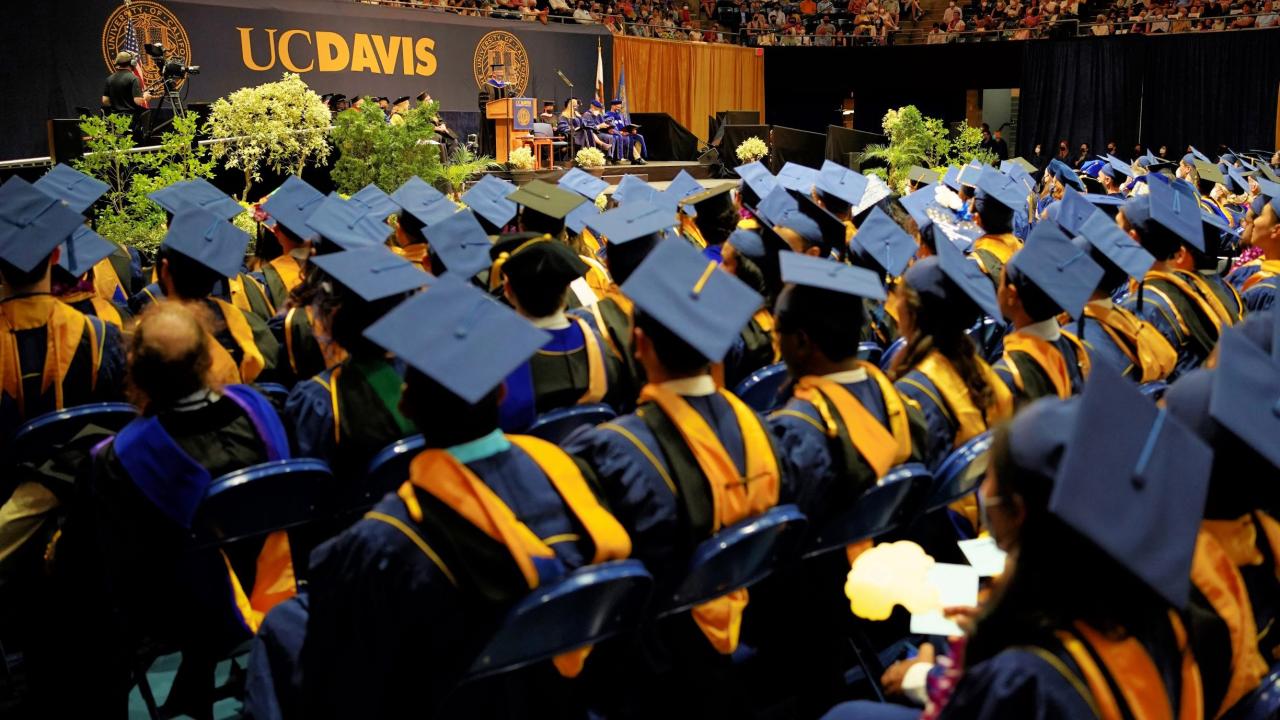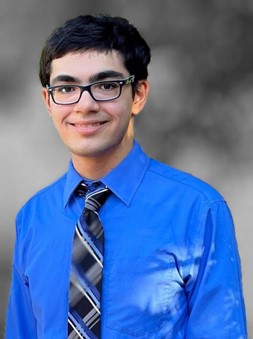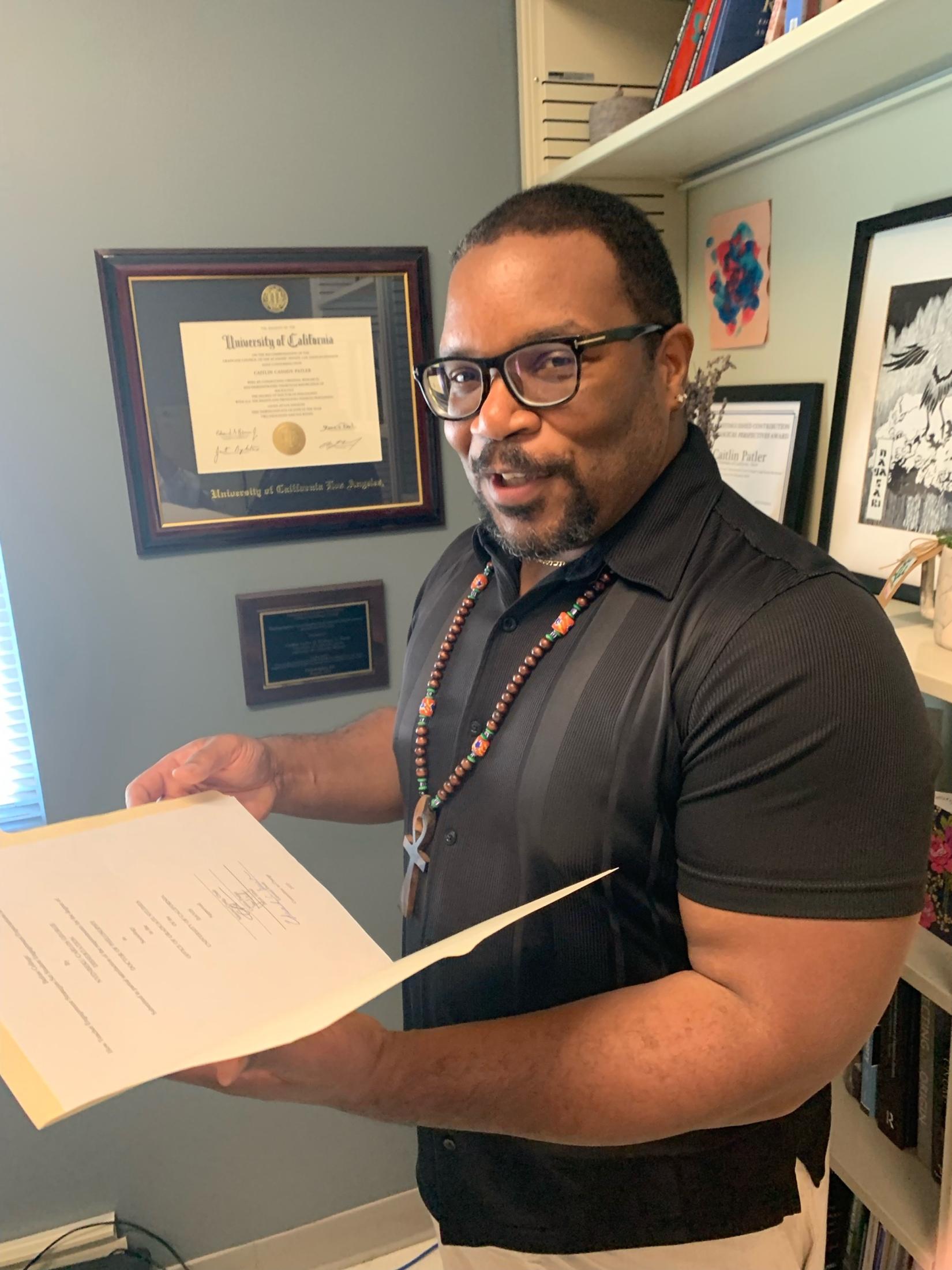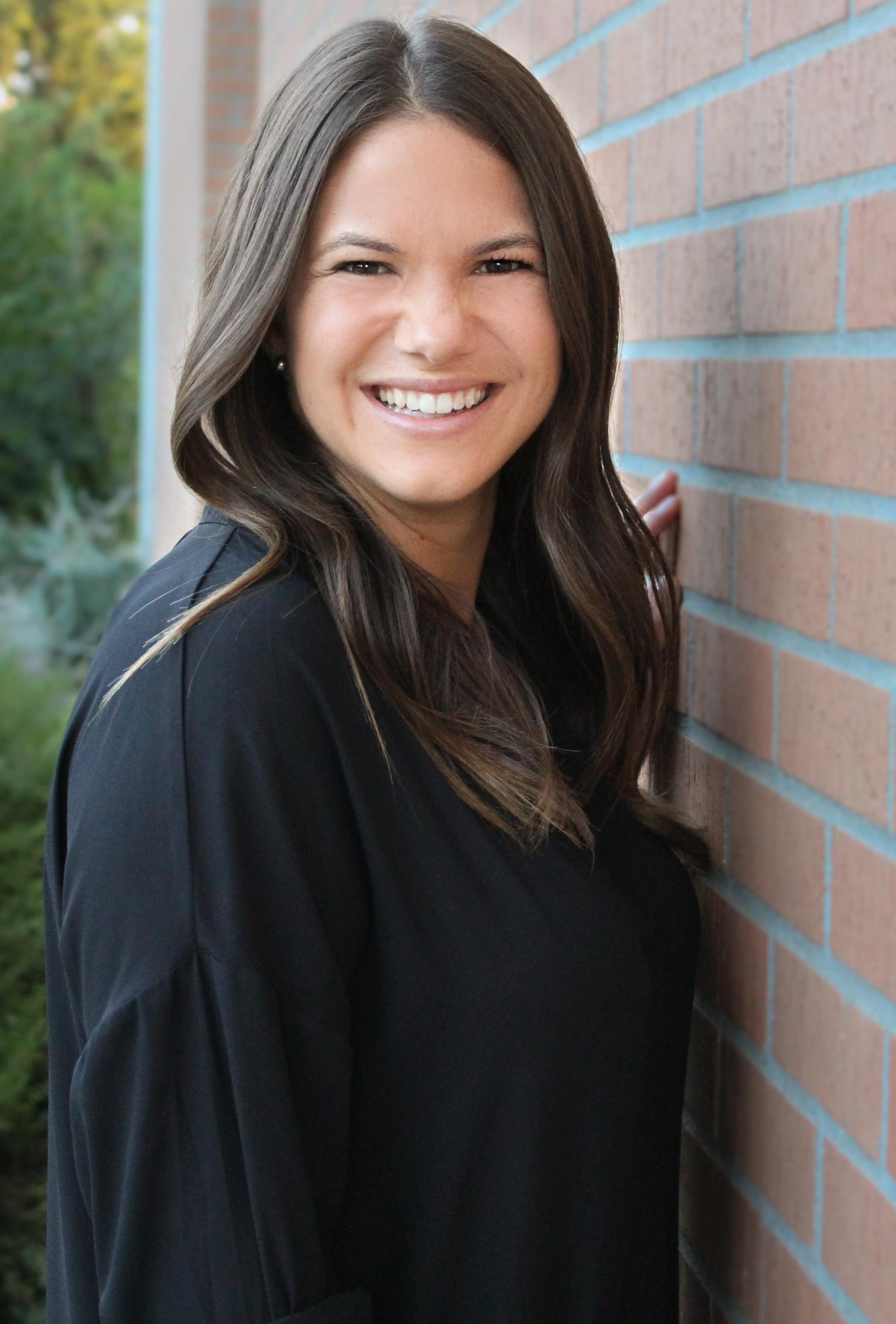
Meet Three Spring 2023 UC Davis Doctoral Graduating Students Poised to Change the World
On Thursday, June 15, more than 800 UC Davis graduate students will cross the Commencement stage at the University Credit Union Center to celebrate a major milestone in their academic careers. Representing the comprehensive graduate education portfolio of Graduate Studies, which includes more than 100 degree programs, these graduates will go on to be the next generation of leaders in academia, industry, public service and other sectors.
From first-generation scholars to graduate students who are addressing student hunger to one of the world's youngest Ph.D. graduates, the class of 2023 is worth celebrating.
We connected with three of our graduating students ahead of the ceremony to discuss their academic journeys.
Tanishq Mathew Abraham

PhD, Biomedical Engineering
Completion date Spring 2023
Why did you choose to come to UC Davis?
I was admitted as a transfer student to UC Davis at 12 years old. Considering my young age, my family living close to Davis, and UC Davis being a good school for biomedical engineering research and education, I chose UC Davis for both undergrad and grad school.
Do you think your UC Davis graduate education has uniquely prepared you to make a difference in your local or global community?
Yes, I definitely think being a UC Davis grad student has prepared me to make a positive impact in the global community. The unique feature of the UC Davis campus, especially for biomedical engineers is the interdisciplinary research environment and collaboration we have with the College of Engineering, School of Veterinary Medicine, School of Medicine and the Medical Center in Sacramento. My research involved collaborating with clinicians, so it made it easier working with faculty within the same university as well as getting clinical specimens.
Is there anyone who had a particular influence on your time here or who impacted you in a significant way?
Yes, there are several people who have impacted my UC Davis life. I especially remember as a 13-year-old attending my first UC Davis class, Prof. William Tavernetti’s Differential Equations who later on became a good mentor to me in my undergrad years. My PhD advisor, Dr. Richard Levenson, was a great influence to me and I learned a lot about histopathology, research and networking skills from him, My PhD dissertation committee members Dr. Randy Carney, Dr. Jinyi Qi, Dr. Orin Bloch from UC Davis and Dr. Faisal Mahmood from Harvard Univ. provided plenty of support and guidance. I am also grateful for the support of the staff in the Levenson Lab, Taryn Morningstar and Nathan Anderson. I am grateful for the support and mentorship of Jeremy Howard, the founder of fast.ai. His fast.ai course had a profound impact on me and enabled me to transition to deep learning research. I am grateful for the fellowship provided by Stability AI and the encouragement from its CEO, Emad Mostaque. Under the leadership of Chancellor Gary May, UC Davis staff and faculty, I was able to thrive in the Aggie community. I am very thankful for my family's constant support, advice, and especially encouragement during the tough days. Without their love, I would not be here today.
What does it mean for you (and perhaps your family) that you earned this advanced college degree?
I was interested in research as a young child. As a 9-year-old, I remember asking my parents to set up a lab at home with microscopes, reagents, test kits etc... So getting a doctorate now at 19 has been a dream come true, though a lot of hard work, rejections and perseverance went into it. I come from a family of researchers and scientists where my grandparents both have PhDs in veterinary medicine and mom was also in the PhD program at UC Davis but couldn't complete it as she had to care for my sister and me, and so they are all happy to see the third generation earn the doctoral degree.
What’s next for you?
I will be continuing research in medical AI through a research organization I founded, Medical AI Research Center (MedARC). I will also be pursuing a postdoc. I am excited to be exploring this growing and innovative field further. I am considering an MD or MBA program but will consider taking a short break from formal coursework before taking it up.
Nyenbeku “Nym” George

PhD, Sociology
Completion date Spring 2023
Why did you come to UC Davis?
I’ve always loved learning and it’s always been a goal of mine to earn my doctorate degree. As a queer man of color, it was about being an example that others see as an option for themselves, as well as having agency in my own life. UC Davis was a solid school, one of the public ivy’s if you will, and it was close to home.
What are some of your favorite memories of grad school?
The people. One of the best people I know, who was a part of my cohort, is Alana Stein. She was there for me and gave me her time. At UC Davis, I also found a really great committee. They sure worked me! But you know what, I KNEW I was going to be successful. Because I knew they believed in me. That’s been the hardest thing I’ve had my whole life: having people fully see me and believe in me. That committee did see me and believe in me. And because of that, there’s nothing I can’t do. And there’s been a lot of joy in realizing what I could do and who I could become in order to do the work. Those are things that no one can take from you. The degree is institutional validation of who you’ve become.
Is there anyone who had a particular influence on your time here or who impacted you in a significant way?
A lot of beautiful people have really poured a lot of love into me through this whole experience, made me connect to my best self and see my own richness. One example is Dr. Jabou McCoy who was the first brother to earn a Ph.D. in sociology at UC Davis in 2015. He is a personal friend, brother and mentor of mine. When I began the Ph.D. program in 2016, I told Jabou that I would be the second brother to do it. I kept my promise. I am the second African American male to graduate Sociology Ph.D. program since 1958. Jabou was there for me through it all. When I think about it and his support, it’s hard not to cry. As graduation got closer, I told him “Man, it would mean a lot to me if you flew out.” He said, “I’ll be there.” Jabou will be flying across the country from New Jersey to attend my commencement.
Is there an aspect of your degree that you are particularly proud of?
There are three things. While being a full-time Sociology Ph.D. student during the past seven years at Davis (2016-2023), I became department chair and chaired my department at Cosumnes River College. I also wrote a 64-page dissertation in four months, during the pandemic! Actually, one of my favorite experiences was writing that dissertation, which is ridiculous because it is hard and scary! But it was also the excitement of persisting and discovering what I could accomplish and how deep I could take my learning. Also, while I was in the Ph.D. program, I took advantage of the opportunity to work as at teaching assistant for UC Davis faculty each quarter which paid my tuition. I am graduating owing $0.00 to the institution. It's crazy to think that I was able to accomplish so much! But this is why I am so exhausted and resting now. God is good!
Marcela DeVon Radtke

PhD, Nutritional Biology with an emphasis in Cognitive Neuroscience
Completion date Spring 2023
Why did you choose to come to UC Davis?
I chose to attend graduate school at UC Davis because I had a phenomenal mentor in my undergraduate education (also at UC Davis) that I wanted to continue working with as a PhD student. My mentor, Dr. Rachel Scherr, provided the utmost guidance and support during my undergraduate research experience and allowed me to have a voice in generating independent projects that I was truly passionate about.
What’s one of your favorite memories from grad school?
One of my favorite memories from grad school was working with the UC Davis SEED Scholars. I helped to develop the fully inclusive program here at UC Davis for students with intellectual disabilities and have served as the head teaching assistant for the first inclusive class on-campus. It has been incredible to witness the amazing progress, both academically and socially that our Scholars have made and as the program expands with our third cohort in 2023- 2024, these students will continue to elevate the UC Davis campus in every way.
Do you think your UC Davis graduate education has uniquely prepared you to make a difference in your local or global community? If the answer is yes, what do you think makes UC Davis unique from other universities?
UC Davis is a unique campus for so many reasons, but I have found the cross-departmental collaboration here to be advancing research in all fields. I have worked with colleagues in the Department of Psychology, the Center for Translational Sciences, the Department of Statistics, and the School of Medicine, among many others. This allowed me different insights and perspectives from other scientists and experts in their respective fields, ultimately improving my work.
Is there an aspect of earning this degree that you are particularly proud of?
I am immensely proud that my work has direct impacts on the UC Davis student body, as well as college students across the nation. My work sought to improve food insecurity through assessing clinical health outcomes. I was involved in every aspect of my research, from the conceptualizing of the projects, to working as a phlebotomist to complete the blood draws. There were long, challenging, and frustrating days in the lab, but I loved every aspect of my work knowing that it could improve health outcomes for students.
What does it mean for you (and perhaps your family) that you earned this advanced college degree?
As the child of immigrant parents, I was always taught that education was the only thing that could never be taken away from you. Whether formal education or self-taught, it has been an honor to achieve an advanced degree and it is my hope as a professor and mentor that I can ignite that same passion for my future students.
